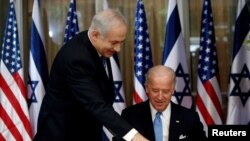As the Biden administration presses to advance a potentially historic Israel-Saudi Arabia normalization deal, observers see problems if the U.S. promises too much to make the deal happen.
The Biden administration is working with Saudi Arabia and Israel on a package of agreements and concessions that could enable the historic foes to normalize relations. Washington says there is still much to discuss for such an agreement to be reached.
But analyst David Ottaway of the Wilson Center in Washington is already raising questions about the prospective deal.
Writing in the Wilson Center’s Viewpoint Series, the senior Wilson scholar said that Saudi Arabia wants a formal security guarantee from the United States in return for normalizing diplomatic ties with Israel.
Washington has already provided $140 billion in military aid and has been Saudi Arabia’s main security partner, so Ottaway wonders why the Saudis want such an agreement now.
“The U.S. only has two such agreements with countries outside NATO,” with Japan and South Korea, he writes. He says if President Joe Biden commits to a security guarantee, he will face “serious questions about when American intervention may become necessary. Nor is it clear what such an agreement would cover in terms of triggering a U.S. military response to what the Saudis themselves declare a foreign attack.”
Analysts like Trita Parsi, the executive vice president at the Washington-based Quincy Institute, point out that the Saudis not only want a security guarantee, but help on a nuclear program from the U.S.
Could this spark an arms race in the Middle East, he asks the institute’s online forum.
“If normalization happens without these concessions, it would be a different story," said Parsi. "But when we are adding these concessions in order to get that normalization, not only does this raise questions about how this advances U.S. interests. It also raises the question why this is needed if normalization is actually good for Saudi Arabia and Israel. Why is it needed for the U.S. to offer this level of concessions?”
Ellen Laipson, who directs international security at George Mason University in Virginia, points out that Biden has made diplomacy central to his presidency, but neither Israel nor Saudi Arabia appears to want strings attached to a deal.
“Israel and Saudi Arabia would be perfectly happy to get new commitments from the United States and it wouldn’t affect their policies towards Russia and China very much. They would insist on their freedom of action,” Laipson said.
Observers say that if the United States helped Saudi Arabia on a nuclear program, it would draw the United States deeper into Middle East politics and heighten concerns that both Saudi Arabia and its foe Iran could acquire nuclear weapons.






